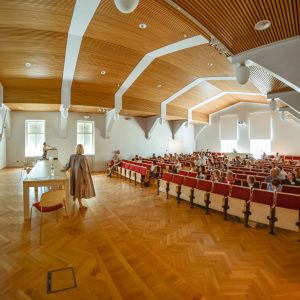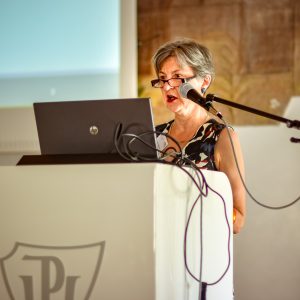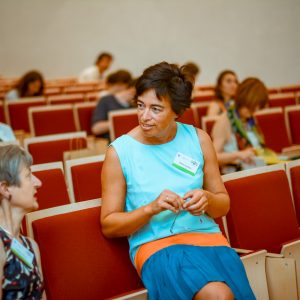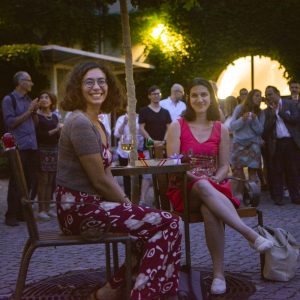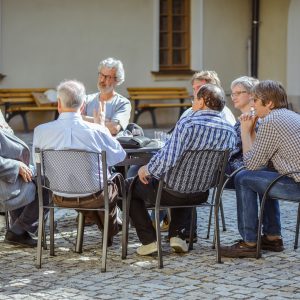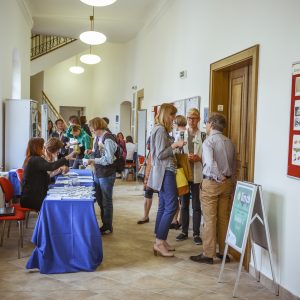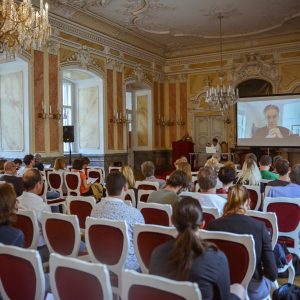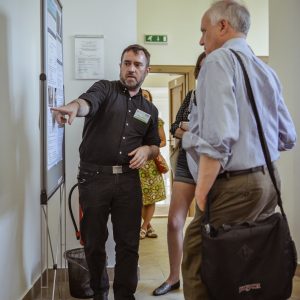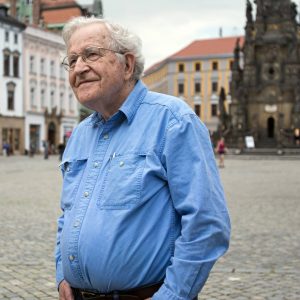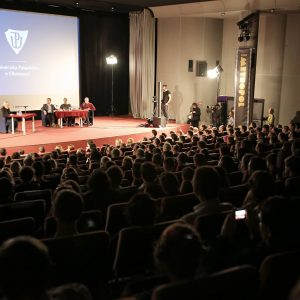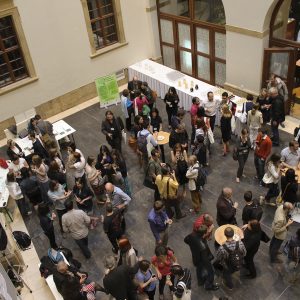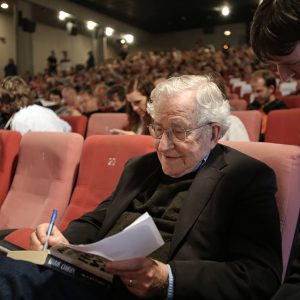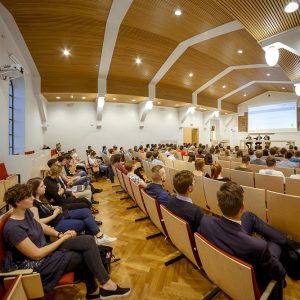
June 2021
The Olomouc Linguistics Colloquium (Olinco) is a general linguistics conference held biannually at Palacký University Olomouc, Czech Republic. It covers synchronic or diachronic aspects of grammar, phonology, semantics, and pragmatics. Papers may treat language description, language acquisition, performance, translation, or language deficits.
The general topic of the conference is language use and linguistic structure. The contributions are expected to include justified proposals for linguistic structure, and at the same time relate these structures to some aspect of language use, such as information structure, phonetics, or meaning. The conference also includes several specialized thematic sessions.
OLINCO 2021: The Olomouc Linguistics Colloquium 5 (Olinco 5), originally scheduled for June 2020, was held online on June 10 – 12, 2021.
Prof. Ianthi Tsimpli
(University of Cambridge)
Thu., June 10, 2021
Aspects of linguistic complexity in monolingual and bilingual children’s grammars
Abstract: Linguistic complexity can be invoked as a cause of vulnerability in language development and use at all levels of linguistic analysis, including the lexicon, syntax and discourse. Bilingual grammars are typically shown to differ from monolingual ones mostly in the use of inflectional morphology and vocabulary, but also in the appropriate use of reference management in connected speech. The causes of the differences have been attributed to reduced language input as well as limitations in processing resources. Focusing on the language production of Greek monolingual and Albanian, German and English bilingual children speaking Greek as the weaker language, I will focus on narrative production data. Measures of subordination and reference tracking will be used as indices of complexity in syntax and discourse. The data suggests that syntactic complexity is not a unified construct, as different types of subordinate clauses (complements, relatives and adverbials), are differentially affected by bilingualism. Typological distance between L1 and L2, levels of academic language developed through bilingual education, and vocabulary skills are relevant for the use of different types of syntactically complex sentences. Reference tracking on the other hand is affected by non-verbal cognitive skills as well as typological distance.
Prof. Susanne Wurmbrand
(University of Vienna, Austria)
Fri., June 11, 2021
Implicational hierarchies in syntax
Abstract: Languages exhibit a variety of different types of complementation, which can be divided into different classes based on their semantic properties and/or their morphosyntactic properties. An important observation made in many works on complementation is that there is a dependency between the meaning of a complementation configuration and the morphosyntactic coding—changing one often also results in a change of the other. This raises the question of whether the meaning of a complementation configuration comes from the matrix verb, the complement clause, or both.
Despite significant cross-linguistic variation in complemenation and the lack of simple surface universals, typological works have also brought out implicational relations, which are an important tool for understanding variation. Specifically, complementation configurations can be ranked according to their semantic properties, forming an implicational complementation hierarchy, along which syntactic or morphological distinctions, if present in a language, operate. I will discuss several phenomena where implicational relations have been observed, among them finiteness, indexical shift, restructuring, and cross-clausal A-dependencies, and show that the uniting factor is the underlying implicational complementation hierarchy. To derive the hierarchy and its implicational nature, I will suggest a synthesis model of complementation where the complement clause and matrix predicate may affect each other and together determine the possible meanings.
Prof. Harald Clahsen
(University of Potsdam, Germany)
Sat., June 12, 2021
Variability and its limits in language processing: Linguistic and speaker-level constraints
Abstract: Much research in linguistics has focused on what is common (perhaps even universal) across different languages and different speakers of a language. At the same time, variability due to, for example, geographical or social factors is also a hallmark of language and language use. Psycholinguistic research faces the same challenge of disentangling variability in language production and comprehension from more general (perhaps universal) mechanisms of language processing. To address this issue, I will report new findings from a large study of language processing in bilingual (Turkish/German) individuals, in comparison to control groups of L1-German and L1-Turkish speakers. Our main finding was that grammatically-based mechanisms of language processing (viz. ‘morphological decomposition’) yielded more uniform performance than lexical access and retrieval processes in bilingual individuals. My conclusion will be that the grammar strongly constrains variability in language processing, even for otherwise heterogeneous individuals.
Important dates
Abstract submission deadline (additional papers): 28 February, 2021
Notification of acceptance (additional papers): 15 April, 2021
Registration fee: EUR 20 (ca. CZK 500). Registration for authors of accepted papers by May 9, 2021 (see Registration below)
* the registration fee covers our expenses on the online conference platform and on the publication of proceedings
Conference: 10 – 12 June, 2021
Proceedings submission deadline: 31 October 2021
Papers and posters
We welcome proposals for full oral presentations and short presentations (posters) in the form of abstracts related to the general topic and/or a workshop topic. Abstract submission guidelines are given below. The language of the conference is English. All abstract submissions will be anonymously reviewed by an international committee of linguists. Participants are allowed to present only one single-authored paper. In addition, they may also have joint papers (but not as the first author).
Thematic sessions
– Constraining Allomorphy | Organizers: Prof. Jonathan Bobaljik, Harvard University, Cambridge, USA; Dr. Pavel Caha, Masaryk University, Brno, CZ
– Language processing from a psycholinguistic and cognitive perspective | Organizers: Dr. Jan Chromý, Charles University, Prague, Czech Republic; Dr. Norbert Vanek, University of Auckland, NZ
I. PROPOSALS: Abstracts of oral presentations and posters (short presentations) need to comply with the following guidelines:
Anonymity. Abstracts must be anonymous. References to one’s own work should be made in the third person. (Please make sure that you do not include your name in the document properties.)
Length. The text of the abstract should contain between 400 and 500 words (one page maximum). Bibliography and tables or figures may be submitted on a second page.
Structure. It is important that the abstracts clearly state research questions, approach, method, data, and (expected) results. In the abstract, you should indicate whether you want your proposal to be included in one of the Olinco 2021 workshops (thematic sessions).
Acceptable file format. The abstract should be submitted as a PDF file. Please make sure that all fonts are embedded in the file. If your abstract is accepted, you will be asked to supply a revised version for inclusion in a book of abstracts (for the templates, see below).
Submission. Please submit your abstract only through the EasyChair system: follow this link. You will be asked to create an account first (if you do not already have one). Please fill out the information required and enter your abstract in the „Abstract“ field. In addition, please make sure you also submit the abstract as a PDF file in the „Paper“ field at the end of the submission form, even if your abstract contains no figures, special characters and so on. Deadline: 28 February, 2021
Please note that participants are allowed to present only one single-authored paper. In addition, they may also have joint papers (but not as the first author).
II. REVISED abstracts (following notification of acceptance)
Format of the REVISED abstract. Please use one of the prepared templates for the revised abstract:
Olinco 2021 Revised abstract template (doc) (MS Word)
Olinco 2021 Revised abstract template (.odt) (Open Office)
Olinco_LaTeX_template (LaTeX; zipped folder)
The revised abstract must be written in Times New Roman 12 point font, with 2.5 cm margins on all sides. The revised abstract must include the authors’ names, affiliations, and email addresses in the heading, which is in Times New Roman 13 (see the template above for details). Do not insert page numbers.
Length of the revised abstract. The text of the revised abstract should be two pages long maximum (including references and figures).
Acceptable file format of the revised abstract. The revised abstract should be submitted as a PDF file . Please make sure that all fonts are embedded in the file.
To be submitted in Easychair by 9 May 2021.
The organizing board is very grateful to all distinguished colleagues who contribute to the conference by reviewing submitted abstracts.
Their full list is here(.pdf).
Registration for presenters is now closed (please contact the organizers at olinco@upol.cz if you are an author or a co-author of an accepted paper and you missed the registration deadline).
Registration for members of audience here (free of charge).
Workshop 1 on Thursday June 10, Topic: Constraining Allomorphy
Organizer: Prof. Jonathan Bobaljik, Harvard University, Cambridge, USA; Dr. Pavel Caha, Masaryk University, Brno, Czech Republic
Descriptions of allomorphy (phonologically unpredictable alternations in the form of a morpheme in some context) seem to require powerful devices (readjustment rules, non-local interactions, morphomes, extensive listing of redundant information, etc). Recent years have seen various attempts across frameworks to restrict theories of allomorphy, for example, in locality or other conditions on possible rules, including proposals to eliminate entire classes of rules (e.g., rules of referral, readjustment rules). This workshop will draw together presentations which speak to the tension between descriptive adequacy and restrictiveness. Papers that address cross-linguistic generalizations as well as those providing in-depth analyses of specific phenomena are particularly encouraged.
Workshop 2 on Saturday June 12, Topic: Language processing from a psycholinguistic and cognitive perspective
Organizers: Dr. Jan Chromý, Charles University, Prague, Czech Republic; Dr. Norbert Vanek, University of Auckland, NZ
The aim of the workshop is to discuss the issues of language processing of various typologically different languages with a special focus on Slavic and languages of Central Europe. The workshop is open to applicants conducting experimental and empirical research in this broad topic. Papers addressing various levels of processing in L1 and/or L2 (from psycholinguistic or cognitive perspective) are welcome (either as oral or poster presentations). Innovative research designs are particularly encouraged.
The conference programme in a printable form (as of June 11, 2021) is available here
The Book of Abstracts is available here (.pdf).
All presentations are oral: Presentations have been scheduled either as talks (35 mins in total including discussion, i.e. 30 minutes‘ talk maximum ) or posters (short talks, 15 mins in total including discussion, i.e. 10 minutes‘ talk maximum).
The language of the presentation is English. Non-English examples should be properly glossed and translated to English.
Platforms: We will use Whova in connection with Zoom. All participants should have Zoom installed on their computers. If you are registered, you can access the conference via Whova here.
Detailed information for speakers is available here.
Presenters choose from two formats:
(a) Giving the talk live, or
(b) using a pre-recorded video and joining the live Q&A session after the talk.
(Even if you give a talk live, you can upload a pre-recorded video as a backup and for participants who miss the talk live.)
Certificate of participation:
If you would like us to send you a certificate of your participation, please fill in this form. We will prepare the certificate and send it to you by email. If you presented more than one paper, please register separately for each paper.
Conference venue
Latest volume:
Selected papers presented at the Olomouc Linguistics Colloquium 2021 have been included in a peer-reviewed volume of conference proceedings entitled Language Use and Linguistic Structure. Proceedings of the Olomouc Linguistics Colloquium 2021.
Previous volumes:
Selected papers that were presented at the Olomouc Linguistics Colloquium 2018 have been included in a peer-reviewed volume entitled Proceedings of the Olomouc Linguistics Colloquium 2018 (included in the Web of Science™).
The book of Proceedings of the Olomouc Linguistics Colloquium 2016 is available here (.pdf).
The electronic version of the Olinco 2014 proceedings, entitled Complex Visibles Out There, can be downloaded here (.pdf). The volume is a part of the Olomouc Modern Language Series.
Selected papers presented at the Olomouc Linguistics Colloquium 2013 are included in the proceedings entitled Language Use and Linguistic Structure (.pdf) and in a separate themed monograph entitled Nominal Structures: All in Complex DPs (.pdf). Both books have been included in the Web of Science™.
If you have any questions, do not hesitate to contact us at olinco@upol.cz.
Previous Olinco conferences:
Olinco 2013:
website
photo gallery
book of abstracts (.pdf)
conference proceedings (.pdf)
monograph (.pdf)
Olinco 2014:
website
photo gallery
book of abstracts (.pdf)
conference proceedings (.pdf)
Olinco 2016:
website
photo gallery
proceedings
Olinco 2018:
website
